Women have always been hidden figures in the civil rights movement
Georgia Gilmore. Ella Baker. Septima Clark. Women who owned businesses and helped to organize boycotts and sit-ins. Why have so many of their names been lost to history?

On Monday, we commemorate the 95th anniversary of the Rev. Dr. Martin Luther King Jr.’s birth. As we rightfully acknowledge his vital contributions to civil rights, it’s important to remember that he didn’t do all this work alone.
Within the civil rights movement, there have always been women whose work played a pivotal role in the success of the struggle.
Georgia Gilmore. Amelia Boynton Robinson. Ella Baker. Septima Clark.
Georgia Gilmore. Amelia Boynton Robinson. Ella Baker. Septima Clark.
These women are largely not household names, yet they were significant contributors to the cause — doing the work, often behind the scenes, hidden from the rest of us.
This holiday is a great opportunity to remember the accomplishments of these hidden figures in the civil rights movement.
I am not sure when I first began to pay attention to these women. Maybe it was when I learned that Jo Ann Robinson and the women of the Women’s Political Council — a civic organization that advocated for Black women — called for the initial bus boycott in Montgomery, Ala. I was proud to learn that these women spent the night running off flyers and then distributing tens of thousands to beauty shops and barbershops, even at the risk of losing their jobs.
Since then, I’ve learned about women like Septima Clark, who helped create Citizenship Schools, which taught Black people throughout the South to read so they could become voters. And Amelia Boynton Robinson, who started working at 10 years old with her mother to help others register to vote, and was one of the key marchers from Selma to Montgomery on Bloody Sunday in 1965.
Then there was Georgia Gilmore, a cook who organized the Club from Nowhere during the Montgomery boycott. The membership rolls were not recorded, as anyone listed could lose their jobs — or even their lives. They sold meals and baked goods, then turned the revenue over to the leaders of the boycott to keep the effort going.
Think, too, about the countless number of beauticians whose names we don’t know but, because they often owned their own businesses, were safe places where women could gather, organize, and strategize freely. There were women right here in Philadelphia who helped to organize boycotts and sit-ins, who worked to bring change in this community, but whose names may never rise to prominence.
Why have so many of their names been lost to history?
» READ MORE: Philadelphia’s ‘Rosa Parks’ gets a headstone 100 years after her death
The answer may lie, in part, in the fact that many Black women adopted a different kind of leadership strategy — one that was more community-driven, without one person representing the endeavor. As Ella Baker, a hero of the civil rights movement, once stated, “Strong people don’t need strong leaders.”
This type of “bottom-up” style of leadership among Black women contrasts with that often used by men, whose top-down style has a tendency to focus on a single leader.
Hidden yet working, these women made intentional choices to use their gifts, talents, and skills to work toward freedom.
Thankfully, we are slowly learning more about the women whose names were omitted from history books, and celebrating their accomplishments.
As we’ve just elected our first Black woman as the 100th mayor of Philadelphia, there is no doubt her name will be forever etched in the annals of our city’s history.
Cherelle L. Parker has made it clear that such an accomplishment would not be possible without the shoulders she stood on — the women in government who came before her, such as Councilmember Marian Tasco.
Everyone owes their rise to someone. For this reason, we’re inviting the community to gather on MLK Day for a program called “Conversations of King: Hidden Faces Behind the Work.” Here, folks from throughout the city — led by a panel of experts — will offer their insights on the significant contributions of women to the civil rights cause.
As a Black woman, I know the struggle that comes with being overlooked and underestimated. As a member of the clergy, I know the feeling of having to shout because my voice and view had already been deemed to be not worth listening to. But despite those challenges, I draw inspiration from one of the quotes King used to inform his own path: “If you lose hope, somehow you lose the vitality that keeps life moving. You lose the courage to be, that quality that helps you go on, in spite of it all. And so today I still have a dream.”
Yes, many women may have been hidden figures in the civil rights movement. But they kept hope, vitality, and courage. And they kept dreaming.
The Rev. Dr. Marsha Brown-Woodard will begin her term in 2024 as the first woman elected to serve as the president of the Baptist Pastors and Ministers Conference of Philadelphia and Vicinity. The panel discussion will take place at the Independence Visitor Center at 1 p.m. on Jan. 15.